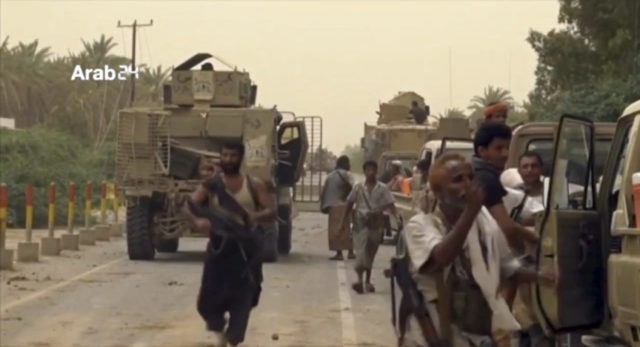The Saudi-led coalition that has been fighting to restore the internationally-recognized government of Yemen reported on Wednesday that the strategically vital airport in Hodeidah was captured from Houthi insurgents without any civilian casualties, despite the Houthi tactic of placing armored fighting vehicles in civilian areas.
“We are now destroying Houthi fortifications near the airport. Hodeidah port is operating as normal and the movement of ships is normal. We have humanitarian and development plans for when we liberate the entire city,” said coalition spokesman Col. Turki al-Malki.
Al-Arabiya reported that Yemeni government forces are conducting strikes on Houthi militia positions and attempting to dislodge the insurgents from residential areas. The campaign to capture the port city of Hodeidah has been underway for one week.
Reuters described fears of civilian casualties in the battle for Hodeidah on Wednesday, noting that the Houthis seem intent on digging in and putting up a tough fight for the rest of the city, while the Saudi coalition and Yemeni government forces are using airstrikes to break their defenses.
At stake is a major supply line to the capital city of Sanaa, currently held by the Houthis. Hodeidah is also significant because the Saudi coalition accuses Iran of using it to deliver weapons to the Houthis, including missiles launched against Saudi cities.
Residents said they were running out of supplies and feared to leave their homes due to the intense fighting. Humanitarian groups are worried about starvation, dehydration, and disease as the fighting disrupts Hodeidah’s water supply. There are concerns about a wave of refugees fleeing the city and running into the minefields deployed around it. The Houthis are using loudspeakers to flood the city with war music and the speeches of their leader, Abdul Malik al-Houthi, who pledged to fight the “invaders and aggressors” even if the entire country is taken from his control.
Houthi militia groups declared a state of emergency in Hodeidah on Tuesday as their fighters fell back from the airport and began filling the city with trenches, tanks, heavy weapons, and rooftop snipers. Local residents were reportedly told they would be punished if they divulged information about the Houthi’s military activities. According to some reports, the water supply was cut off across much of the city because the Houthis deliberately sabotaged it, in addition to inadvertently damaging pipes while digging defensive fortifications.
The Wall Street Journal quotes analysts who believe the battle for Hodeidah could mark the beginning of the end for the grueling Yemeni civil war, as the Houthis simply cannot afford to lose the city. Not only does it supply Sanaa (and bring in weapons from Iran for the insurgents, according to critics of Iranian influence) but it contributes about $40 million per month in revenue to those who control the port city.
Hodeidah could also represent the last opportunity for the Houthis to use human shields and civilian suffering as a weapon, as there is universal agreement the already desperate humanitarian situation in Yemen would become much worse if the flow of humanitarian aid through the port is disrupted. The great majority of the food and other aid shipped into Yemen passes through Hodeidah.
The United Arab Emirates, another member of the Saudi coalition, says it has 50,000 metric tons of food ready to send into Hodeidah and plans to work around any effort to shut the port down.
Humanitarian groups also report having large amounts of food, water, and medicine positioned around Hodeidah, openly stating that they are preparing for a worst-case scenario and worrying they will be unable to deliver supplies to civilians because of fierce fighting. Another major concern is the lack of good field hospitals in the area to care for wounded civilians.
According to the Saudi coalition, about 250 Houthis were killed in the battle for the airport and another 87 were taken prisoner. The airport is actually outside the city itself, so the next stage in the battle for the city will involve moving into residential areas for fierce urban combat. The coalition claims to have a battle plan that will involve taking the city quickly without intense street battles near the center.
The best-case scenario is that the Houthis will agree to some negotiated settlement instead of fighting, but it’s difficult to see how a deal could be struck since their insurrection is unlikely to survive the loss of Hodeidah for very long.

COMMENTS
Please let us know if you're having issues with commenting.